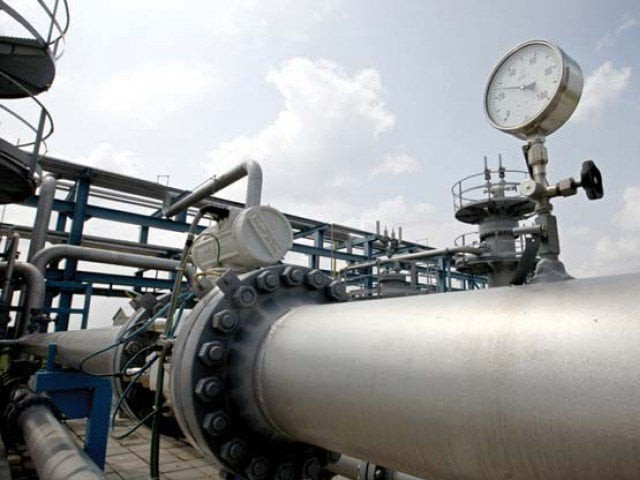PTI govt issues ordinance to waive over Rs300b GIDC dues
PTI govt writes off half of liabilities of industrialists, late payment surcharge

Govt writes off half of liabilities of industrialists, late payment surcharge. PHOTO: REUTERS
President Arif Alvi on Tuesday promulgated the Gas Infrastructure Development Cess (Amendment) Ordinance 2019 to waive half of the outstanding liabilities of fertiliser, textile, power generation and compressed natural gas (CNG) sectors. The ordinance was published in the official gazette on Wednesday.
Through the presidential ordinance, the government also reduced GIDC rates by up to 75%, which would push down prices of gas and fertiliser for the end-consumers.
The life span of a presidential ordinance is four months, which can be extended for another four months. During this period, the ordinance has to be passed by both houses of parliament or else it will lapse.
According to the Petroleum Division statistics submitted in the National Assembly, as of the end of December 2018, the total principal liabilities of these sectors stood at Rs416.3 billion and half of those were written off by the government.
Cumulative GIDC collection since 2012 stood at Rs701.5 billion till the end of December 2018, of which only Rs285 billion had been deposited.
The government also waived the late payment surcharge, which was supposed to be paid at the rate of 4% plus three-month Karachi Interbank Offered Rate (Kibor). Three-month Kibor currently stands at 13.7%, which means the government has written off 17.4% mark-up, which brings the total to over Rs300 billion.
The ordinance did not address the issue of how to refund 50% GIDC to those companies that timely discharged their legal obligations and paid the entire amount of GIDC.
The PTI came to power on the slogan of introducing a fair and transparent system where the rich and poor will be treated equally. Contrary to that, it has written off over Rs300 billion in favour of the rich but has burdened ordinary people, irrespective of their bearing capacity, with heavy taxes.
The liabilities have been written off on the condition that these companies will withdraw their cases against the GIDC levy.
The amount waived in favour of the industrialists, mainly Karachi-based, was more than the total loans written off from 1971 to 2009 that stood at Rs256 billion. GIDC had been imposed in 2011-12 that immediately became controversial after the industrialists took the government to court.
However, after the Pakistan Muslim League-Nawaz (PML-N) government addressed legal deficiencies through an Act of parliament in 2015, there were strong chances for the government to win these cases.
Under provisions of sub-section 3 of Section 3 of the 2015 Act, the defaulters, both gas consumers and gas companies, were liable to pay mark-up at the rate of 4% plus three-month Kibor with effect from July 2015. Now, the mark-up will be applicable from July 2019 - a gift for the industrialists.
Through the presidential order, the government also allowed the CNG sector to again avail the scheme and pay only half of the outstanding cess levied for the period May 2015 to December 2018.
Similarly, according to sub-section 6 of Section 3 of the ordinance, the fertiliser sector (including feed and fuel), captive power, industry, K-Electric, generation companies and independent power producers shall pay half of the outstanding cess levied or charged up to December 2018.
These sectors have also been allowed to offset their GIDC dues against their sales tax refunds and subsidy claims under the Drawback of Local Taxes and Levies (DLTL) scheme with the FBR. This means the government will not receive even half of the remaining amount in cash.
These industrialists have been allowed to make payments in two instalments - first within one month of signing an agreement and second within three months of the agreement.
The delay in signing the agreement with the gas companies would provide further excuse to these industrialists to delay the payments.
Beneficiaries
Half a dozen fertiliser companies have been given the benefit of Rs69 billion, which they had collected from the poor farmers but refused to deposit in national coffers. Total outstanding amount against them was Rs138 billion as of the end of December 2018.
Total dues against the textile sector were Rs42.5 billion, of which about Rs21.2 billion was waived. Liabilities of captive power plants stood at Rs91.4 billion and half of it was waived. The CNG sector owed Rs80.1 billion, of which Rs40 billion was written off.
Liabilities of the IPPs amounted to Rs7.1 billion and Rs3.6 billion was waived. Outstanding principal dues against K-Electric and Genco stood at Rs57.4 billion and Rs28.7 billion was written off.
New GIDC rates
The government has completely waived GIDC of Rs300 per mmbtu on feed gas for new fertiliser plants. Rates for feed gas for old plants were cut by half to Rs150 per mmbtu and for fertiliser fuel to Rs75 - also a 50% reduction.
The GIDC rate for the CNG Region-I has been halved to Rs131.2 per mmbtu and to Rs100 for the Region-II. Similarly, rates for the IPPs, K-Electric and Genco were reduced by half to Rs50 per mmbtu and for the captive power plants and erstwhile zero-rated industry to Rs50 from Rs200 per mmbtu.


















COMMENTS
Comments are moderated and generally will be posted if they are on-topic and not abusive.
For more information, please see our Comments FAQ